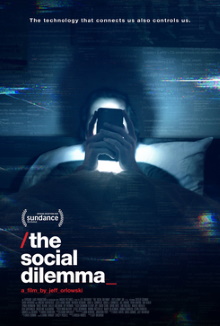This is too important a documentary to skip over so here it is despite my own misgivings about its shallowness in some ways and how it looks and feels over-produced and over-dramatized to grab your attention in the exact same way that the social media it criticizes does. Like everyone says, the centrality of social media in today’s society makes this a near mandatory film to watch even as I wish that it could have taken a more measured approach with a wider perspective and less breathless alarmism.
Beginning with Tristan Harris, recounting his growing realization that his work at Google is increasingly focused on making social media as addictive as possible, this film features interviews with executives from many other tech companies who share similar concerns. In order to demonstrate how social media is deliberately engineered to consume as much of the user’s time and attention as possible, it includes a dramatic reenactment of a fictional family whose members suffer from being overly addicted to electronic devices and misled by the false information being spread online. They also talk about how the algorithms that feed content and advertising to users are easily manipulated by malicious actors to deliberately provide a skewed view of society or sabotage the foundations of a democratic society. Warning that the consequences of leaving the tech companies unchecked might be no less than the downfall of civilization, they advocate strict government regulation of their activities or perhaps a novel business model that is entirely different from the current one that is driven by advertising.
The array of prominent executives who the filmmakers manage to gather to make this collective statement is certainly impressive and makes for a good reason to engage with this documentary seriously. By and large the message that they want to convey here isn’t new to those paying attention to the field and I am irked by the spurious use of by now trite quotes such as Clarke’s dictum about sufficiently advanced technology. But as a film that is aimed at persuading the general public, I suppose it works well enough and clumsy as the scenes of using actor Vincent Kartheiser to represent the inner workings of a recommendation algorithm are, it is one way to visualize it. I especially appreciate how the various interlocutors take pains to note that the current state of affairs isn’t due to malicious intent of the original designers, but something that organically grew out of the need to grow fast and to find a way to monetize the vast reach that subsequently resulted. I also like the focus on especially ensuring that children’s exposure and usage of social media must be supervised and limited by responsible parents.
The focus on making this documentary more accessible and engaging to the general public does come at the expense of intellectual depth. The film does at one point show someone asking how social media addiction is any worse than previous panics about new forms of entertainment appearing to which Harris has only a weak reply. It’s good to speak to so many executives, but it would have been better to speak to historians and other academic types who can take a broader perspective. In my view, it is indeed important to supervise children’s access to social media but to talk about the collapse of civilization due to this addiction is as silly as the moral panics over television and pop music. On the other hand, malicious agents taking advantage of the freedom of speech on social media to mount what are effectively attacks on the fabric of democratic societies is indeed concerning but I feel that the issues shouldn’t be conflated. The solution to the latter is that democratic governments must accept that freedom of speech on the Internet shouldn’t be completely unconstrained after all, a statement that this film seems reluctant to say out loud.
I do agree of course that the tech companies need to be better regulated and it is only natural that they would resist that for fear of it to protect their profits. But I think that the tech companies don’t actually want to have the responsibility to adjudicate between what is or isn’t true on the Internet at all. It’s clear that the US government itself with its many levels and divisions cannot agree on what the truth even is so it’s too much to expect that the social media companies can make that determination. The filmmakers here are clearly in favor of more government oversight of the tech companies, which I broadly agree with, but this also means submission to the government of the day. Somehow I don’t think they would be happy if someone like Trump got to have the final say of what is or isn’t allowed to be said on social media.
